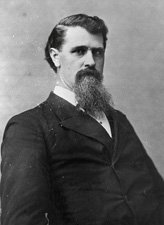James Henderson Berry
James Henderson Berry (born May 15, 1841 in Jackson County , Alabama , † January 30, 1913 in Bentonville , Arkansas ) was an American politician and between 1883 and 1885 Governor of Arkansas. He also represented this state in the US Senate between 1885 and 1907 .
Early years and political advancement
James Berry came to Arkansas with his parents in 1848, where they settled in Carroll County . He then attended the Berryville Academy and then studied law. He was only admitted to the bar in 1866, after the civil war . During the Civil War he fought as a lieutenant in the ranks of the Confederate and lost his right leg in the Second Battle of Corinth , Mississippi . After the war he worked first as a teacher and then as a lawyer.
Berry's political career began in 1866 when he was elected to the Arkansas House of Representatives . In 1872 and 1874 he was re-elected to this Chamber of Parliament. He even became their president ( speaker ). In 1876 he was elected chairman of the Democratic Party's regional convention in Arkansas. Between 1878 and 1882 he was a judge in the state's Fourth Judicial District. On September 4, 1882, he was elected as the candidate of his party for the new governor of Arkansas , where he prevailed with a share of the vote of almost 60 percent against the Republican W. D. Slack.
Arkansas Governor and US Senator
James Berry began his two-year term on January 13, 1883. During his time as governor, the national debt was reduced and short-term loans were repaid. It was then that a Nervous Disease Hospital was established and the Arkansas Bar Association was established. Some labor laws were also passed. Berry personally intervened against lynching when he prevented the unlawful hanging of a number of African Americans accused of murdering a white farmer in Howard County . Berry did not stand for possible re-election in 1884.
After the end of his term as governor, he was elected to succeed the retiring ex-governor Augustus Hill Garland in the United States Senate sent. He remained in this office in Washington for the next 22 years . There he was a member of several committees. In 1910 he became a member of the Arkansas Historical Commission. He was commissioned to locate the graves of all Confederate prisoners of war who died in Union prisons on the basis of the available documents. In December 1912 he was able to submit a final report. James Berry passed away shortly afterwards. He was buried in Greenwood . Berry was married to Lizzie Quaile, with whom he had four children.
literature
- Robert Sobel and John Raimo (Eds.): Biographical Directory of the Governors of the United States, 1789–1978. Volume 1, Meckler Books, Westport, 1978. 4 volumes.
Web links
- James Henderson Berry in the National Governors Association (English)
- James Henderson Berry in the Encyclopedia of Arkansas (English)
- James Henderson Berry in the Biographical Directory of the United States Congress (English)
- James Henderson Berry in the database of Find a Grave (English)
Individual evidence
| personal data | |
|---|---|
| SURNAME | Berry, James Henderson |
| ALTERNATIVE NAMES | Berry, James |
| BRIEF DESCRIPTION | American politician, governor of Arkansas |
| DATE OF BIRTH | May 15, 1841 |
| PLACE OF BIRTH | Jackson County , Alabama |
| DATE OF DEATH | January 30, 1913 |
| Place of death | Bentonville , Arkansas |


